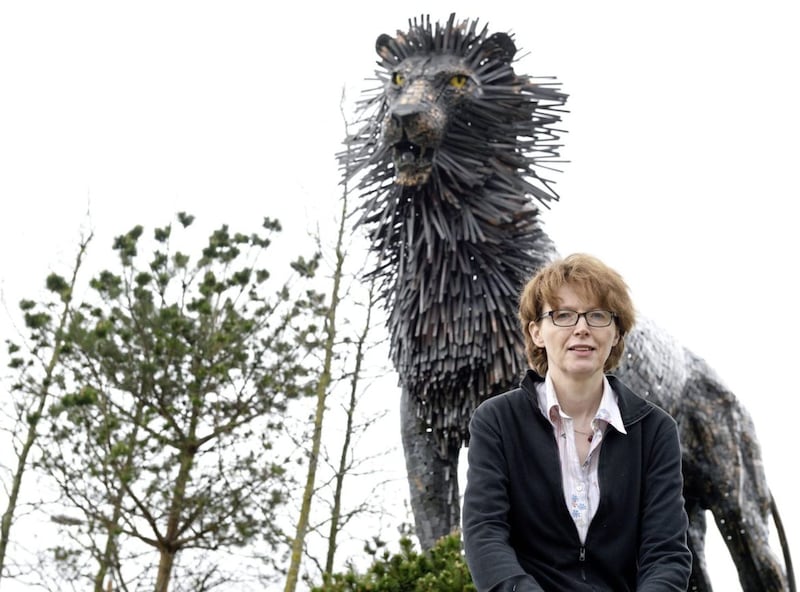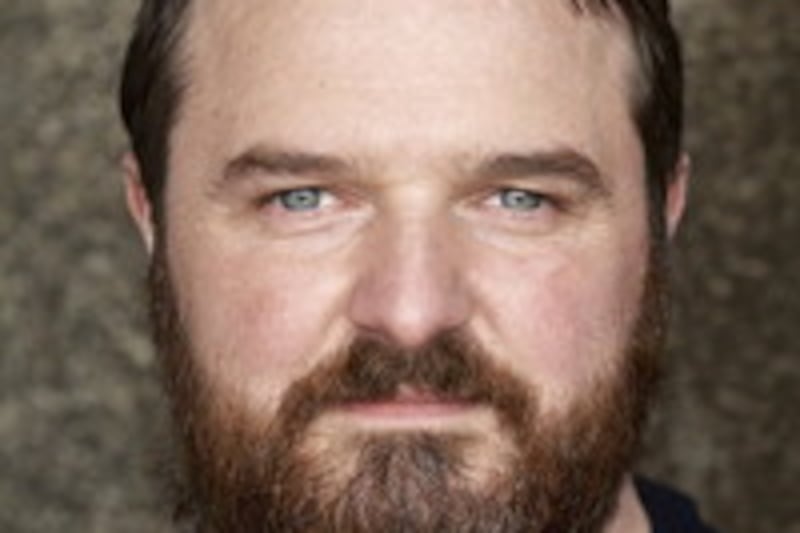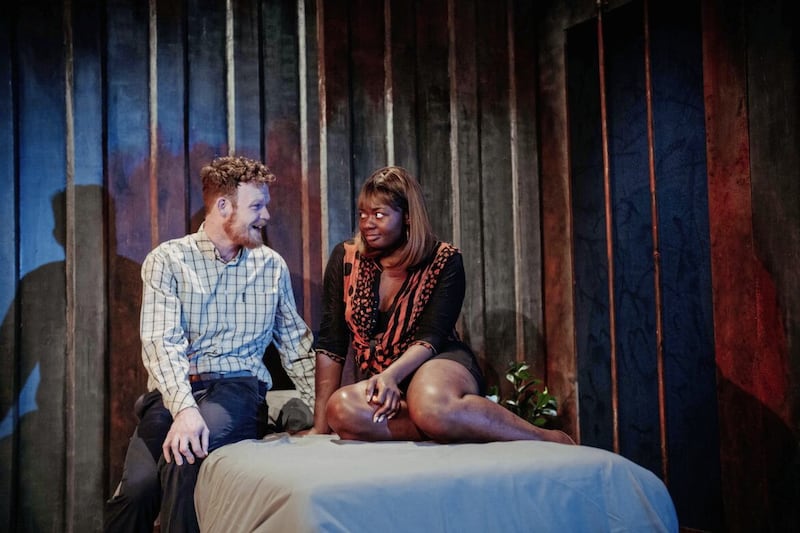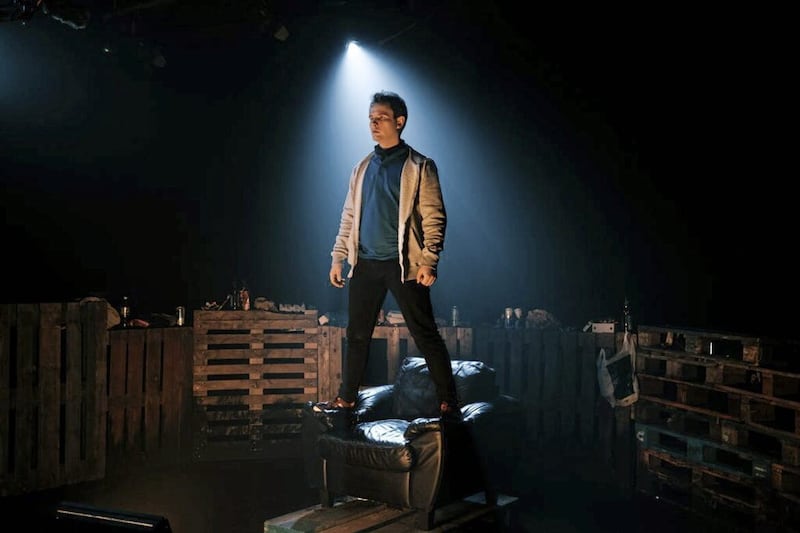ANYBODY who still thinks Northern Ireland is repressed should read Rosemary Jenkinson.
The characters in her new collection of short stories, Marching Season (published by Arlen House), certainly don't echo Ian Paisley or say 'No' to different, new experiences.
In fact, they tend to say, 'Yes, yes, yes' to life, echoing Joyce's Molly Bloom. And that includes physical love in all its manifestations.
There is a well described threesome in The Cure for Too Much Loving which suggests the novelty, initial embarrassment and potential for manipulation as well as the pleasure. There's a brief, lusty encounter in the magnificent opening story which reveals you can't travel back in time to reprise a potential relationship although you may want to.
Inevitably there's a deal of flirting, ogling, experimentation - and love too in a story like What Happened to You, in case you wondered.
Meeting Jenkinson (54) in an Ormeau Road café, provides an insight into her generation's take on short fiction, gender issues, pleasure and the whole damn thing. Asked whether she regards her work as risqué, the writer says: "Yeah, I write graphic sex but it's always about the emotions as well."
Jenkinson goes on with a smile to reveal that she has a keen interest in close encounters. She says: "I have a healthy interest in the male body, maybe not shared by everyone here. Many women in Northern Ireland have been discouraged from sharing that interest or writing about it."
One woman in the story The A, B and C's of Modern Living (extracted below) bemoans the fact her romantic career has not been more extensive, thinking she may have missed out on significant experiences: "I was thirty-seven now, but in my twenties I'd turned down quite a lot of men because (a) I was in a relationship, (b) I cockily considered myself too beautiful for them, (c) I enjoyed exercising my elusive sex goddess power, (d) The alcohol was wearing off."
This is pretty much what we expect from men through the ages, and in books, and note the telling adverb in B. It's the remark of a Don Juan or maybe a Martin Amis character or somebody like Malcolm Bradbury's The History Man. It's liberating in a way, liberated too and there is a sudden sense of sexual equality springing from these pages.
At the end of Life is Short but Fun Should Be Had, a short story firmly set in the digital age about a man who may be wrongly accused of inappropriate use of social media and the woman who agrees to take him on trust, our heroine sums up her feelings. She says she doesn't care if he did misbehave as she is simply "relieved and delighted" to have gone to bed with him.
Jenkinson agrees she apportions equal romantic rights, adding that that she is unusually frank in her approach even among women writers of her generation. "Male writers such as Bernard MacLaverty write openly about sex, and I remember scenes involving older women, but I think I'm more or less the only woman doing the same here. It feels a bit transgressive."
We discuss whether the religious nature of Northern Irish society has led to a kind of literary pudeur or modesty. "It's that whole religion thing, yes, and young people were discouraged from being interested in physical love. But I try to write about sex from the spiritual aspect too." There are instances where the physical, emotional and spiritual collide. "When we're physically very close, we're trying to know the unknowable."
She cites one of her stories that is set in Greece, What Happened to You. It's about a young woman teacher and her love of her female friend, something different from her relationship with her boyfriend back home. "She can't touch her, so there is something spiritual about this love for a girl. She thinks about death, about being cremated in the future and wants to grab at life."
Jenkinson, who wanted to write from an early age, was educated beyond the green or orange, in the Quaker boarding school at Lisburn. She recalls the freedom it gave her. "It was a mixed school and I was more aware of things than most of my age. Of course, Protestant girls were thought to be more racy and Catholics more uptight, because of their beliefs."
She feels there was a kind of puritanism around in her youth. "There was less promiscuity among Northern Irish young people in their teens and twenties."
Jenkinson studied Old English at Durham University which she admits was slightly disappointing as a subject. "Everybody was doing English Literature and I wanted to do something different but it wasn't as interesting as it looked on paper."
She has taught English as a foreign language, lived in Kent, and uses elements of her own experience in her fiction. A noted dramatist, Jenkinson has written plays about the Titanic (White Star of the North), the appeal of the Twelfth (Billy Boy) and is interested in questions of national identity.
Wittily, the title story, Marching Season, describes the experience of a group of drag queen friends on the unionists' key date. Humour is another element in Jenkinson's writing and she also introduced me to a new word or two - always a positive thing - including 'sapiosexual', which means being attracted to people's brains.
Asked which short fiction writers she rates, Jenkinson lists women: "Lucy Caldwell, Jan Carson, Tama Janowitz and Tania Farrelly."
Written during Covid, Jenkinson's latest collection reflects our longing for connection and so chimes with the age.
February 14 is our designated 'hearts and flowers' day, though. So what will Ms Jenkinson be doing for Valentine's Day?
"I'll go out for dinner, as I always do with a platonic male friend. In a way, it's an anti-Valentine thing but we are still out there, marking it."
Marching Season by Rosemary Jenkinson is published by Arlen House.

The A, B and C's of Modern Living
In this extract from The A, B and C's of Modern Living, the opening story of Rosemary Jenkinson's Marching Season, a garden party takes an unexpected turn...
THAT summer, I was in the middle of painting a series of works provisionally titled, 'Male Muses'. It would have been larger had I actually kept in touch with more of the guys from my past, but it consisted of four exes who agreed to model for me. Because there were only four, I began to think about all the experiences I'd missed out on in my life. I was thirty-seven now, but in my twenties I'd turned down quite a lot of men because (a) I was in in a relationship (b) I cockily considered myself too beautiful for them (c) I enjoyed exercising my capricious power as some elusive goddess (d) the alcohol was wearing off. Looking back though, I couldn't help regret missing out on some beautiful men.
A few days later, I went to the summer reception held by the Secretary of the Irish Department of Foreign Affairs. Secretary in politics apparently meant 'chief' and not some admin person. A sure sign you were doing well in the art world was getting invited to such dos, and I didn't mind being a token artist as long as it got me some beer tokens.
It was one of those warm, grey summer evenings when my taxi turned off the Malone Road into a leafy lane. The actual house was pretty hideous, all reinforced concrete with dark, bulletproof windows, a relic from the Troubles. I shook the hand of the Secretary and scored a beer in a fancy glass and went through to the garden. The grass was beautifully manicured and overlooked by giant beech trees on the hillside.
The garden was also sprouting journalists, politicians, CEOs, twitterati, and community leaders, the latter comprising quite a few reformed paramilitaries. I spotted another artist being swooned over by a couple of women, but I didn't join him. I rarely got swooned over, which wasn't down to me so much as to the simple fact that men were less sapiosexual than women. Instead, I downed my beer, refilled it and threw myself into the mix.
I sidled over to a comedian I knew from the TV who was standing on his own. He had a really bright red nose, so I guessed he liked a good drink. It was bulbous too like a clown's.
"All these journos and politicos," I said. "I wonder why we were invited?"
"Because we are people of influence."
"Under the influence," I laughed, tilting my glass.
He didn't even smile.
A woman came up and hugged him. I knew her face from Twitter and she knew of me too.
"Talking of which," she said, getting her phone out. "Let's do a post."
"Great," I said, flicking my hair back. The gallery owners were always telling me to be more prominent on social media.
"You take it," she said, handing me her phone.
Disgruntedly, I snapped her and the comedian cosying up, raising their glasses, then headed straight for another refill. And another. The canapés were doing the rounds but I was too busy chatting to partake. Soon, I kept asking people their names again, getting names wrong, ending up with business cards I would lose later. After another beer I offered to join up a top diplomat's freckles with a pen. Around me, the dusk was blowing through the garden and the guests were thinning out. I finished my drink and phoned a taxi.
"Hey, Cora." Someone was tapping me on the shoulder.
I turned to see a guy I didn't recognise.
"Remember, it's me, Connal?"
"Oh, God, yeah!"
Connal Power was a musician I hadn't seen in about eight years. I hardly knew him with his cropped silvery hair. He used to have long curly, blond hair framing his fine features. He was the sort of guy you might have called pretty but for his slatey eyes and muscles.
"I know," he said, running his hand over his head. "I'm fifty now. I'm a silver fox."
"Well, I'm a red vixen," I replied and he laughed.
An image of him kept running through my mind from years before.
"Let's go out for a drink some time," I said.
"Yeah, great." He entered his number into my phone, all the time chatting about how he'd been away playing music in the USA and Australia.
I would have talked more but my taxi was waiting. I hurried out the sliding glass doors, narrowly avoiding decapitation from the hanging flower baskets wheeling around in the wind.
It was only when I got into a taxi with a stone-cold sober driver that I realised how drunk I was. My voice sounded slow, loud and slurred like a record on a low revolution. I didn't bother trying to make small talk but let the taxi take me back to my road with its tanning salons and dog-grooming salons or dog-tanning salons or whatever it was these days. I gave my pocket a squeeze just to check that my phone was still there. It was.
As the taxi passed through the city, I remembered how years ago Connal had asked me to go home with him, how he'd held on to my arm, even as I said I was going, and how I'd looked back at him, full of longing and rejection. It struck me that there were no a, b's, c's and d's in life, only a's; no reasons not to, only reasons to and you had to act fast or lose everything. I felt a sudden hummingbird quiver in my stomach and knew I would see him again.
Marching Season by Rosemary Jenkinson is published by Arlen House.








